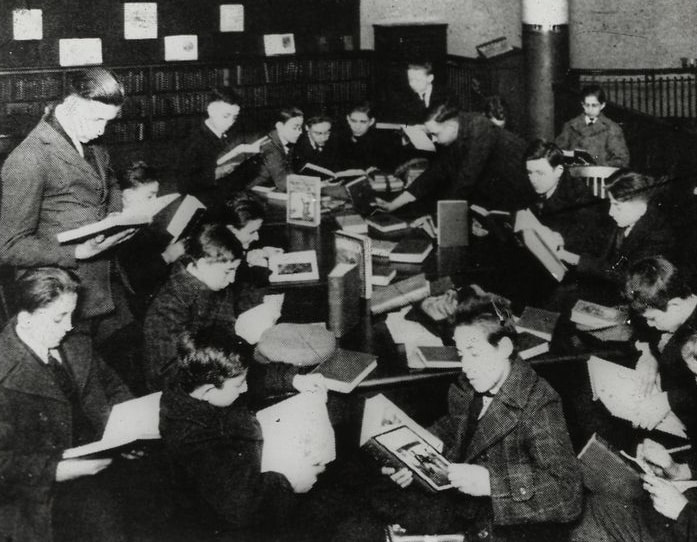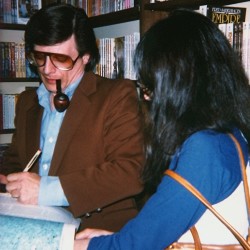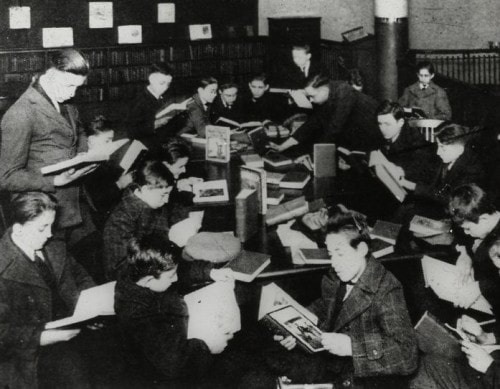Sour Grapes: Publishing Industry Insiders Bemoan The Rise of Outsider Book Bloggers

The Times of London recently took up the cause of the literati who are dismayed that they should have to read the same books as the hoi polloi book bloggers that persist in publishing their reviews online.
Earlier this week Bill Gates was profiled in the NYTimes as a book blogger (a hobby he has pursued for over six years now), and The Times (paywalled) is not happy about the attention he is receiving:
Mr Gates is one of the most high profile of the so-called celebrity book bloggers who, as a diversion from the day job, have now taken to literary criticism. Art Garfunkel, David Bowie and the Facebook founder Mark Zuckerberg have also all waxed lyrical online about their reading habits and preferences.
The trend has not been universally welcomed.
“What does Bill Gates know about books?” D.J. Taylor, a critic, asked. “It is curious to me that we would not accept that in other areas of culture. If you watch Match of the Day, you want Alan Shearer as a pundit.”
And:
The rise of the celebrity critic follows the explosion in online reviews on sites such as Amazon. D.J. Taylor, whose latest book, The Prose Factory, in part explores the “migration of serious [literary] criticism”, said that authors became exasperated at the reviews of amateur critics. “The average writer when asked about Amazon reviews hold their head in their hands,” he said.
…
“There has been a loss of critical authority,” he said. “You have to have some kind of language, some kind of protocols to have the conversation about the meaning of books. Some say, ‘I didn’t like that book because I could not relate to the character.’ Well, what has that got to do with it?”
The literati have been lamenting for years now that the general populace is literate and capable of sharing its opinion on the internet. Some have even gone so far as to proclaim that book bloggers are harming literature.
"Eventually that will be to the detriment of literature, Peter Stothard told The Independent in 2012."It will be bad for readers; as much as one would like to think that many bloggers opinions are as good as others. It just ain’t so. People will be encouraged to buy and read books that are no good, the good will be overwhelmed, and we’ll be worse off. There are some important issues here."
To put it another way, he’s saying that there’s a shit volcano of book bloggers out there who are obscuring the reviewers worthy of attention.
Well that’s just too bad; with more and more newspapers and other legacy publications scaling back their book review sections, and with more books being published every year, online book bloggers are the future. And thanks to the democratizing nature of the internet everyone gets to have their say.
As Grant Feller points out at Forbes, that’s not a bad thing:
Has the mass of unargued opinion devalued film criticism or has it made bylined critics less snobby and more attuned to people’s tastes? Has the mass of unargued opinion devalued travel experts who jet around the world on PR-funded freebies, or has it made hotel establishments keener to keep the customer satisfied? Has the mass of unargued opinion destroyed news journalism or made it faster, fresher and sharper?
He’s not wrong.
Feller reminded me of a point previously made on this blog, that the mass of content available online (the shit volcano, as some would put it) is not a problem because you learn to develop filters so you can ignore the vast amount of unwanted content.
To put it another way, if a book blogger gushes about a book you end up hating, you’ll come away from the experience with the awareness that your tastes differ from the blogger’s. You’ll be more careful about trusting the book blogger’s next review. In other words, you’ll be a consumer who’s past experiences informed your future purchases.
But of course, we already knew that, which is why the whole issue of "unqualified" reviewers is less a problem than it is a case of insiders whining about the end of their exclusive privileges.
images by Pip R. Lagenta, jwyg


Comments
Greg Strandberg January 8, 2016 um 1:35 pm
How are those wagon wheel makers doing? Oh, that’s right, they went out of business when technology changes destroyed their industry.
I’d be scared if I was a newspaper critic as well. I’d probably lash out. Maybe, just maybe, that will halt the wheels of modernity and I can keep that job and perhaps scratch out the few remaining years needed to get my pension.
Barry January 8, 2016 um 4:13 pm
I was enjoying your article and it got me thinking about both sides of this issue, and I was pretty much taking your side, although not completely since I do see the point of their complaints as well, but life goes on as the world changes and I do enjoy reading blogs more than I enjoy reading book critics.
And then you said what you did about shit volcanoes and proved their point. Blogs are good and useful and full of information and when bloggers grow up and become more professional they’ll be even better.
Barry
Nate Hoffelder January 8, 2016 um 4:26 pm
But that’s not my word. It was coined by the professional book author that I linked to, so if you have an issue with it then take it up with him.
Edit: This gets off the topic, but does anyone else want to weigh in?
DebbyS January 8, 2016 um 5:41 pm
Sour grapes? I think we can all suggest some cheese to go with their whine…
Hmm, picture of pipe-smoking author looks like Harlan Ellison, famous writer whose work I read in the 1960s.
CJJ January 8, 2016 um 6:02 pm
There have been enough pompous book critics over the decades who endeavored to destroy good writers because they either didn’t like them personally, were jealous of their talent or because they refused to "kiss the ring". Often it was all of the above.
Competition is a good thing.
Will R. January 8, 2016 um 6:05 pm
"People will be encouraged to buy and read books that are no good."
Heh. Yeah, traditional publishers would never jump on something like, say, "50 Shades of Grey" if it looked like it might sell.
Dan Meadows January 9, 2016 um 9:12 am
The shit volcano term is absolutely applicable to this. It’s also not lost on me that the person who coined that is now writing Star Wars tie-in novels helping a mega-corp like Disney make billions from cynically recycling a beloved 40 year old film. Shit volcano, indeed.
Nate Hoffelder January 9, 2016 um 9:34 am
@ Dan
Yes, Chuck was making the exact same point as Stothard and the others, only in more inflammatory language. It was definitely relevant.
And what is more interesting was that it was coined and advocated by a pro author, and not the indie authors he disdains. And then it was snobbishly thrown in my face, even though I didn’t invent it.
DavidW January 9, 2016 um 11:58 am
The comment that you make about people giving up on book bloggers when they don’t agree with them is bad not good. That is intentional myopia, cutting out dissenting opinion to surround yourself with a bubble in which your perceptions and opinions are always validated and never challenged.
This is why literary critics serve a purpose that book bloggers and user reviews simply can not. They look for qualities that make a book important to read even if they don’t match our current aesthetic. They offer opinions that challenge our mindset instead of conform to it. Many works that are considered to be literary classics today were poorly understood, received and read in their time.
And Peter Stothard has a point. It is difficult from a google search to find a well educated literary critic instead of someone simply paid to post blog entries. It is not straight forward to find great works vs. currently popular works. It is difficult for critics to bring to the attention of the public lesser known works that are worth reading. And that is the coolest thing that critics do is find those works and explain why we should be reading them.
Egalitarianism should not apply here. While it is easy for someone to read a book and offer an opinion, their analysis is usually not as insightful as one offered by a literary critic. A critic is usually someone who devoted their college and grad school education to the study and analysis of literature and then went on to pursue a career in the same field. They usually are also experienced writers.
Filtering out works that are not to our taste is a survival instinct in the world of the "shit volcano", but also filters out great works that we are sadly missing out on. The problem of content makes the role of the critic more important than ever!
Nate Hoffelder January 9, 2016 um 12:08 pm
I didn’t recommend "people giving up on book bloggers" or "cutting out dissenting opinion". I choose milder terms specifically to avoid that possibility. While I agree with you about reading contrary opinions, I also do not plan on spending my money on entertainment that I will not enjoy.
Sour Grapes: Publishing Industry Insiders Bemoan The Rise of Outsider Book Bloggers | The Passive Voice | A Lawyer's Thoughts on Authors, Self-Publishing and Traditional Publishing January 9, 2016 um 12:00 pm
[…] to the rest at The Digital Reader and thanks to Barry for the […]
SpringfieldMH January 9, 2016 um 1:45 pm
"The average writer when asked about Amazon reviews hold their head in their hands"
Let me help you with that…
"The average writer when asked about Amazon reviews prays for lots of reviews"
BP December 5, 2016 um 12:03 pm
'Some say, ‘I didn’t like that book because I could not relate to the character.’ Well, what has that got to do with it?”'
How about…everything? The NYT and other "professional" viewers are very limited in the genres they review, namely, ones very few people actually read. The NYT just reviewed a romance novel a year ago or so and it was the first, despite billions of readers worldwide. But, such novels are below them. They need to ask themselves not who is qualified to do book reviews, but who they think is worthy of even reading books. They’re snobs, period. How many novels about single 20-somethings in NYC struggling with their life crises do we need?
me December 5, 2016 um 6:52 pm
lol, I dont really know, I think there is much to say about professional critiques. I publish books, and have 1 review of 1 star. Im not too fussed as my game play is longer term, but it was a calculated hit that did nothing positive, just made out I was copying and pasting text, which im not. However, I think it leads me to think that most reviewers have a personal agenda whether thats race, sex, culture etc. People can vote more than critique. What I mean is they will say loads of good things about an author because that author is one of their kind, regardless of how good they are.I see reviews and I know they are from friends and close clique members. I also see reviews by reviewers that pretend to review books but actually only review their friends books and some other items in the mainstream to place their own book reviews in good company. Point is that there is a huge amount of bias and underhand activity. And I think we do suffer for it. It might be nice for book reviews to fall under a licence of prefessionalism, although I would never advocate that. Personally I just see it all as a sharade these days. No one is 'discovering' my books. Clearly im not in the right circles. I think the difficulty is that all reviewers think they have power and they excersise that power accordingly. They know that if they review a book they will pass on sales to the author. It changes the game. We dont have the situation we did 15 years ago where people really reviewed books because they liked them. Also, books are different to films. They take mental agility to read, time and effort. Films don’t. Films are easy. Sit down, veg out for an hour, write a load of crap. With books they have to actually read them and pay attention. Its more demanding and I think they need to leverage that for a return even if its just an invisible power play.
BP SHEA December 6, 2016 um 7:21 am
I’m not sure that 15 years ago reviewers reviewed books because they genuinely liked them. NYT bestselling authors were and are represented by agents who have lunch with NYT editors. The NYT bestseller list itself is heavily curated and doesn’t reflect what most people are actually paying to read. If anything, the bias was worse back then. It’s not perfect now, but the problem isn’t that we do or do not need gatekeepers to curate. The readers themselves need to learn how to do that, to distinguish what’s good or not. That’s entirely subjective anyway, but I would rather let God sort them out than be limited to what one executive in Manhattan tells me to read (and decides is even available). You raise a good point about agendas and culture. Ask any black author who tried to get published in the last 30 years. They were told "there’s no market for your work" and shown the door. They never even got a chance for a review. I have no nostalgia for that time. I don’t think the power play has gotten worse, it just features different players.